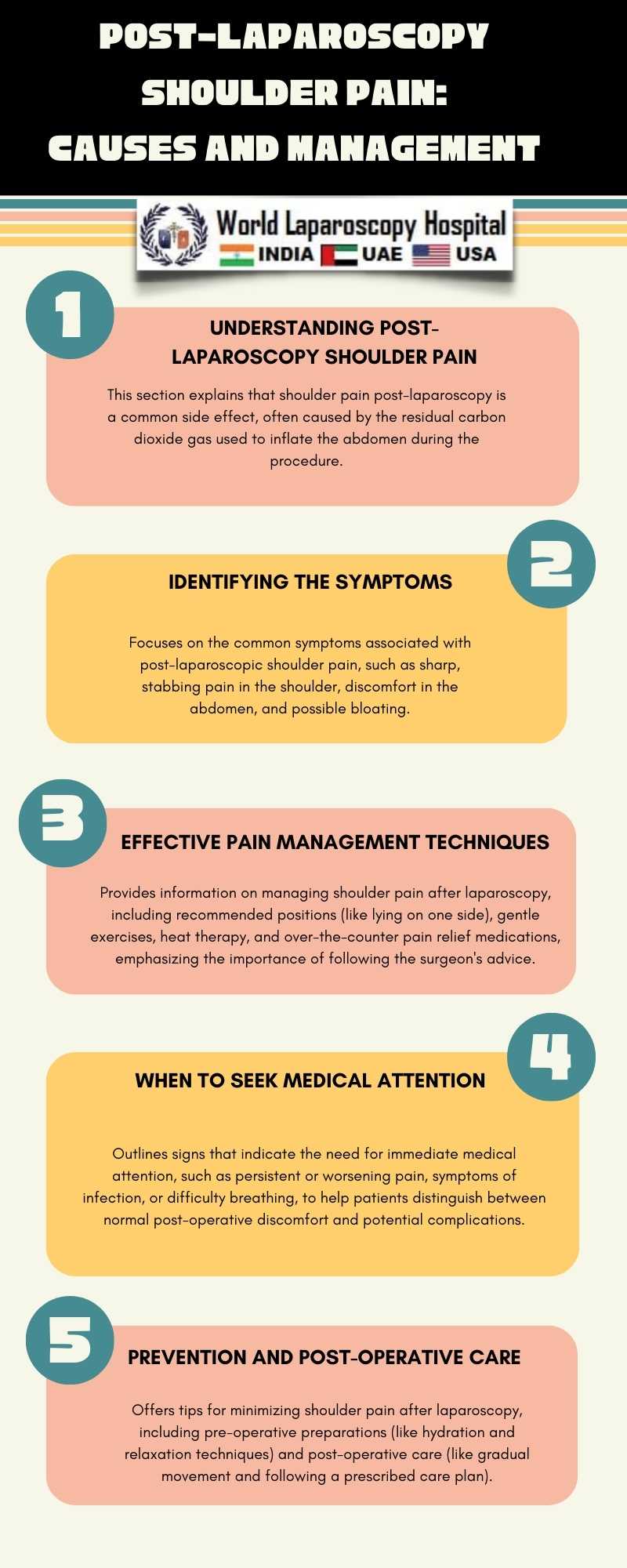Post-Laparoscopy Shoulder Pain: Causes and Management
\Introduction:
Laparoscopic surgery, a minimally invasive surgical technique, has gained widespread acceptance due to its benefits like smaller incisions, reduced pain, and quicker recovery times. However, post-laparoscopy shoulder pain (PLSP) is a common and often unexpected side effect. This essay explores the causes of PLSP and discusses various management strategies.

Causes of Post-Laparoscopy Shoulder Pain:
1. Residual Carbon Dioxide Gas: During laparoscopy, carbon dioxide (CO2) gas is insufflated into the abdominal cavity to create working space. Residual gas, not entirely removed at the end of the procedure, can irritate the diaphragm and lead to referred pain in the shoulder.
2. Diaphragmatic Irritation: The diaphragm, when stretched or irritated, can refer pain to the shoulder via the phrenic nerve. This phenomenon explains why PLSP is typically felt in the shoulder despite the absence of direct surgical intervention in that area.
3. Positioning During Surgery: The Trendelenburg position, often used during laparoscopic procedures, can contribute to shoulder discomfort post-surgery due to the strain it places on the shoulder muscles.
4. Inflammatory Response: The body's natural inflammatory response to surgical trauma can contribute to discomfort in various areas, including the shoulder.
Management Strategies:
1. Effective Gas Evacuation: Ensuring complete evacuation of CO2 gas at the end of the procedure can significantly reduce PLSP. Techniques like manual pressure on the abdomen and positioning the patient in a way that aids gas expulsion can be effective.
2. Pain Medication: Nonsteroidal anti-inflammatory drugs (NSAIDs) and acetaminophen are commonly prescribed for managing PLSP. In some cases, stronger pain medications may be required.
3. Physical Therapy: Gentle exercises and physical therapy can help alleviate shoulder pain by strengthening and stretching the shoulder muscles.
4. Heat and Cold Therapy: Application of heat or cold packs can provide temporary relief from pain and inflammation.
5. Patient Education: Educating patients about the possibility of PLSP and ways to manage it can help them prepare for and cope with this side effect.
Prevention Strategies:
1. Modified Surgical Techniques: Utilizing low-pressure pneumoperitoneum and ensuring careful positioning of the patient can help minimize diaphragmatic irritation.
2. Preemptive Analgesia: Administering pain relief before the onset of pain, a practice known as preemptive analgesia, can be effective in reducing the intensity of PLSP.
3. Intraoperative Techniques: Methods like warm insufflation of CO2 gas and the use of long-acting local anesthetics at trocar sites have shown potential in reducing PLSP.
Conclusion:
Post-laparoscopy shoulder pain, while not a severe complication, can significantly affect a patient's recovery experience. Understanding its causes and implementing effective management strategies are crucial for enhancing patient comfort and satisfaction post-laparoscopy. With advancements in surgical techniques and pain management, the impact of PLSP can be minimized, further improving the overall outcomes of laparoscopic surgery.
Laparoscopic surgery, a minimally invasive surgical technique, has gained widespread acceptance due to its benefits like smaller incisions, reduced pain, and quicker recovery times. However, post-laparoscopy shoulder pain (PLSP) is a common and often unexpected side effect. This essay explores the causes of PLSP and discusses various management strategies.

Causes of Post-Laparoscopy Shoulder Pain:
1. Residual Carbon Dioxide Gas: During laparoscopy, carbon dioxide (CO2) gas is insufflated into the abdominal cavity to create working space. Residual gas, not entirely removed at the end of the procedure, can irritate the diaphragm and lead to referred pain in the shoulder.
2. Diaphragmatic Irritation: The diaphragm, when stretched or irritated, can refer pain to the shoulder via the phrenic nerve. This phenomenon explains why PLSP is typically felt in the shoulder despite the absence of direct surgical intervention in that area.
3. Positioning During Surgery: The Trendelenburg position, often used during laparoscopic procedures, can contribute to shoulder discomfort post-surgery due to the strain it places on the shoulder muscles.
4. Inflammatory Response: The body's natural inflammatory response to surgical trauma can contribute to discomfort in various areas, including the shoulder.
Management Strategies:
1. Effective Gas Evacuation: Ensuring complete evacuation of CO2 gas at the end of the procedure can significantly reduce PLSP. Techniques like manual pressure on the abdomen and positioning the patient in a way that aids gas expulsion can be effective.
2. Pain Medication: Nonsteroidal anti-inflammatory drugs (NSAIDs) and acetaminophen are commonly prescribed for managing PLSP. In some cases, stronger pain medications may be required.
3. Physical Therapy: Gentle exercises and physical therapy can help alleviate shoulder pain by strengthening and stretching the shoulder muscles.
4. Heat and Cold Therapy: Application of heat or cold packs can provide temporary relief from pain and inflammation.
5. Patient Education: Educating patients about the possibility of PLSP and ways to manage it can help them prepare for and cope with this side effect.
Prevention Strategies:
1. Modified Surgical Techniques: Utilizing low-pressure pneumoperitoneum and ensuring careful positioning of the patient can help minimize diaphragmatic irritation.
2. Preemptive Analgesia: Administering pain relief before the onset of pain, a practice known as preemptive analgesia, can be effective in reducing the intensity of PLSP.
3. Intraoperative Techniques: Methods like warm insufflation of CO2 gas and the use of long-acting local anesthetics at trocar sites have shown potential in reducing PLSP.
Conclusion:
Post-laparoscopy shoulder pain, while not a severe complication, can significantly affect a patient's recovery experience. Understanding its causes and implementing effective management strategies are crucial for enhancing patient comfort and satisfaction post-laparoscopy. With advancements in surgical techniques and pain management, the impact of PLSP can be minimized, further improving the overall outcomes of laparoscopic surgery.
1 COMMENTS
Dr. Sudhir Roy
#1
Jan 27th, 2024 10:22 am
Post-laparoscopy shoulder pain, though not severe, can impact recovery. Understanding causes and implementing effective management strategies are crucial for enhancing patient comfort. Advances in surgical techniques and pain management can minimize PLSP, improving overall laparoscopic surgery outcomes.
| Older Post | Home | Newer Post |





